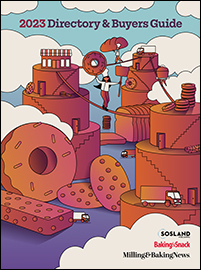Food safety is of utmost importance for bakeries — just one small mistake on the production room floor can result in costly downtime or a product recall that severely damages a company’s reputation. And while bakers strive to maintain tip-top food safety practices, they face many headwinds in doing so.
“The regulatory environment today is very comprehensive; there’s a lot of asks of the baking industry,” observed Gina Reo, president of Quality Assurance Strategies. “There’s usually not a lot of investment in technology except in larger companies, so it’s very difficult for folks to manage all the regulations that are coming fast and furious.”
These include the final rule on traceability under the Food Safety Modernization Act, as well as the addition of sesame as the ninth major food allergen, requiring some bakers to significantly alter operations.
On top of this, manufacturers are struggling to find and maintain enough workers to effectively put food safety practices into action.
“People movement out of operational and sanitation roles and lack of availability of people can lead to challenges with training and consistent implementation of standard operating procedures,” noted Des Flahive, senior vice president, food safety and quality assurance, regulatory and compliance, Aspire Bakeries, Los Angeles.
And while no longer at early pandemic levels, supply chain issues have left an “echo” effect across the industry that bakers are still grappling with.
“It’s very difficult for bakeries to play catch-up and make sure they have the right ingredients and the right mix and yet comply with the ingredient statements on their labeling,” Ms. Reo said.
With all these challenges bakers face on the food safety front, establishing a robust food safety program and culture is essential to ensuring their operation continues to fire on all cylinders.
“A strong food safety culture establishes a shared commitment among all employees to prioritize food safety in every aspect of their work,” said Lance Roberie, founder, Food Safety and Quality Services. “By embracing a robust food safety culture, bakery staff are more likely to follow proper hygiene, sanitation and food safety plan procedures, thus reducing overall food safety risk and meeting food safety objectives.”
Perfecting the program
Of course, building a sound food safety program and a culture that buys into it is easier said than done, and there are several key steps bakers must take to accomplish these goals.
“Firstly, conduct a thorough analysis of the bakery’s specific food safety needs, considering regulatory requirements and potential hazards of products produced,” Mr. Roberie said. “Based on this analysis, develop clear and concise training materials that address these needs.”
Investments in training should be viewed as investments in the quality of a facility’s baked goods, Mr. Roberie emphasized. Employees properly trained on the latest regulations and best practices are the ones who prevent potential safety hazards and product recalls of these goods.
Ms. Reo recommended modular training as the most effective form of food safety education, providing employees with smaller, more frequent and engaging lessons.
“A lot of folks shut down a facility or find some downtime to do a crash course in an all-day or hours-long session of training, providing it to staff as a one-shot deal,” she said. “It’s not the best method I believe going forward.”
Food safety training isn’t typically the most entertaining activity, and because of this, Ms. Reo recommended bakeries also mix in different training methods to keep employees interested.
“You don’t want to just bore them to death with slides. You want to engage them with demonstrations or go out and walk on the floor,” she said. “You want to make it as real life as possible for them to understand the training and then make sure they can repeat it back to you.”
Flowers Foods, Thomasville, Ga., for example, has developed a 12-month quality and food safety training plan for all bakery team members, said Molly Schmidt, senior vice president of food safety, quality and regulatory, which is tracked and regularly reported to leadership.
Ongoing education programs like these help employees stay on top of an ever-changing regulatory landscape. Aspire Bakeries uses a character called SIFIRI (See It, Fix It, Report It) as its food safety ambassador, which constantly draws employees’ awareness to the bakery’s food safety expectations.
“Each employee is charged with making an individual commitment to safety through their actions and behaviors, which we call ‘Food Safety Pledges,’ and these are posted on the walls at our bakeries,” Mr. Flahive said. “Ongoing food safety engagement takes place via shift huddles, town halls, SIFIRI events and the annual Food Safety Week.”
Once a program is put in place, bakeries should keep a close eye on their metrics, including audit scores and downtime, to make sure it’s running smoothly.
One great metric for bakeries to implement, Ms. Reo said, is Right First Time.
“Every case you’re putting out the door should 100% meet your requirements, and if you have to go back and rework a case of product or put it on hold because you have to investigate a problem, that takes away from your Right First Time number,” she explained. “That’s a good easy metric that people can put in place, and the employees can be involved with checking that number as well.”
She added that many auditors from the US Food & Drug Administration (FDA) today want to walk through the bakery, observing and speaking with workers to ensure they understand food safety protocols.
“To repeat that back and have the assessors from the FDA know that the employees understand that training is very important,” she said.
Mr. Roberie emphasized that a food safety program isn’t complete without diligent record keeping that tracks the program’s performance.
“If you didn’t record it, it didn’t happen,” he said. “Records are the window to an operation’s history. If records are good, then the company is perceived to have good history as well. If records are inconsistent and incomplete, it can cause concern for regulators and customers.”
This article is an excerpt from the July 2023 issue of Baking & Snack. To read the entire feature on Food Safety, click here.






